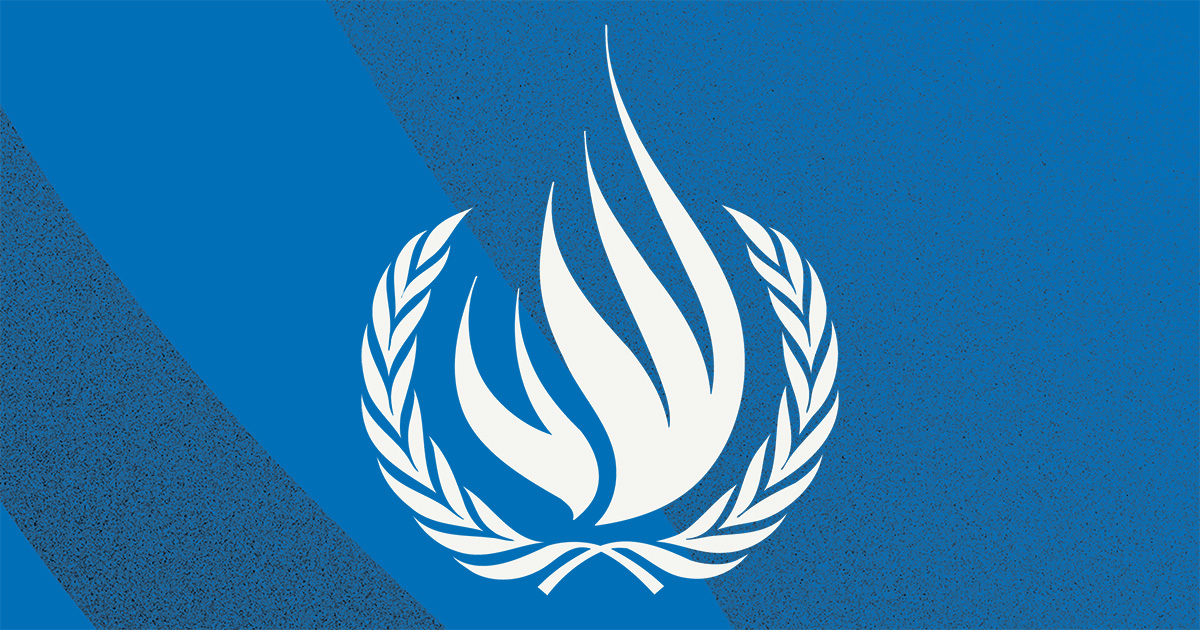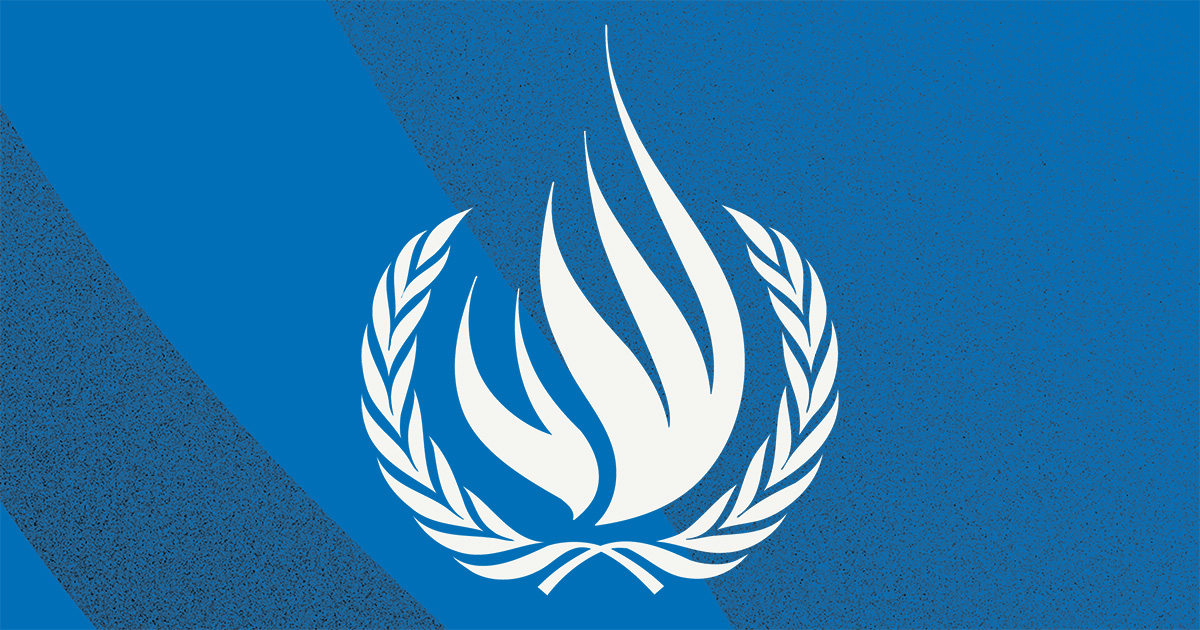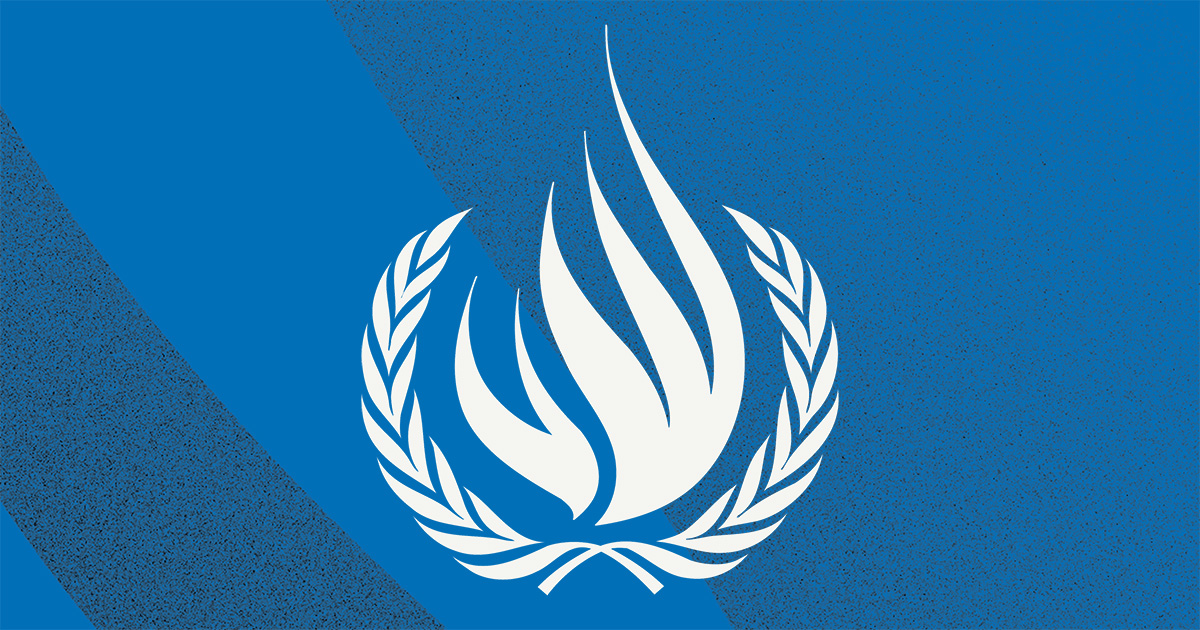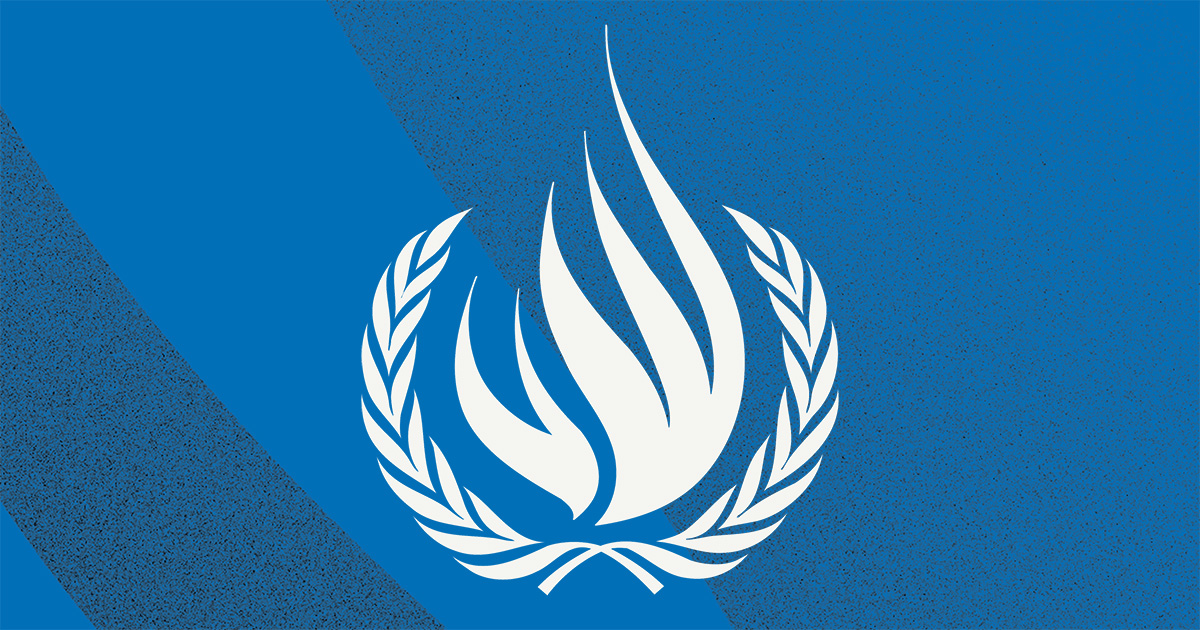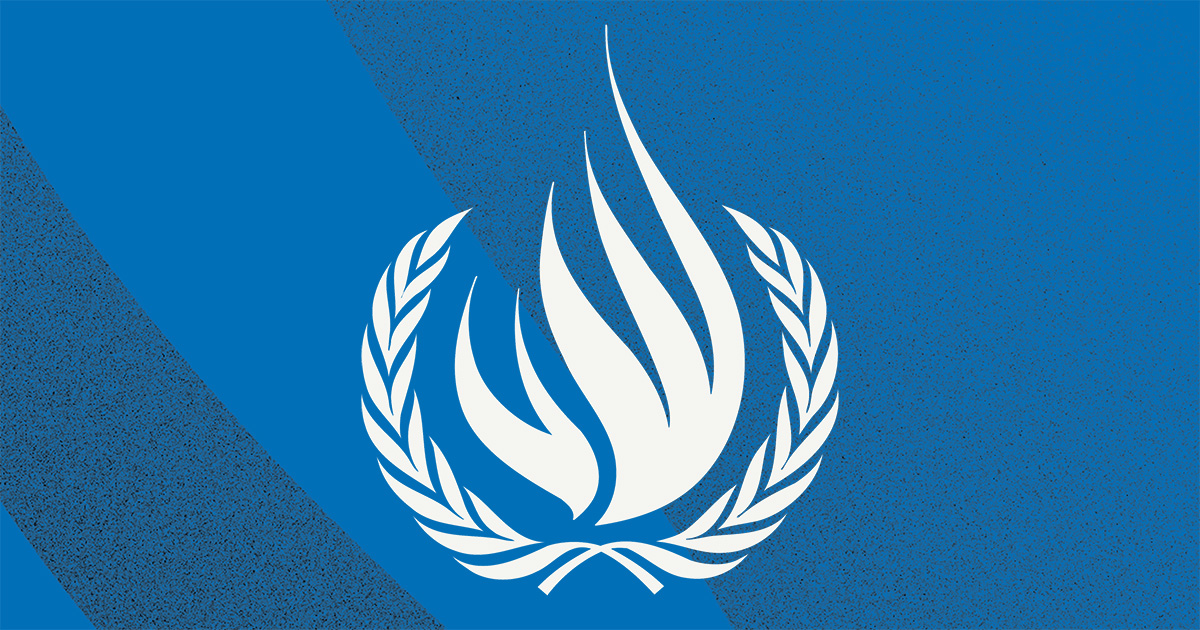
Bonjou tout moun, kouman nou ye. Mwen se William O’Neill, Ekspè Endepandan sou sitiasyon dwa moun nan peyi Dayiti. Mwen kontan la avèk nou jodi a pou pale sou vizit mwen fè nan peyi Dayiti. Mwen rankontre ampil otorite, manm oganizasyon, entelektyèl epi mwen vizite Penitansye Nasyonal ak prizon Okap Ayisyen. Pwoblèm yo ampil, gen ampil bagay ki pou fèt pou dwa moun nan peyi Dayiti. (Hello everyone, how are you? I"m William O"Neill, Independent Expert on the situation of human rights in Haiti. I"m pleased to be with you today to talk about my visit to the country. I met many authorities, members of civil society organizations, intellectuals and visited the National Penitentiary and the Cap-Haitian prison. The problems are numerous and there is a lot to be done for human rights in Haiti.)
Let me start by thanking you all for being here. Thank you to the Government of Haiti for supporting this mandate, following the visit of the United Nations High Commissioner for Human Rights last February. I appreciate the openness and commitment of the authorities to respect, protect, and fulfil human rights. Thank you to BINUH for the welcome and the support provided. Finally, thank you to the civil society organizations and the victims that I had the chance to meet.
I have just spent ten days in Haiti, a country that I know well having lived and worked there for several years, particularly within the International Civil Mission in Haiti (MICIVIH) and civil society. I had the honour, in 1995, to have contributed to setting up the National Police of Haiti (PNH) as well as the School of the Magistrature.
Unfortunately, I found a country bruised by violence, misery, fear, and suffering. The human rights situation is dramatic, all rights are violated. Gangs continue to terrorize, especially in more than half of the capital Port-au-Prince, which has become a lawless zone. Women and girls continue to be raped by gangs, often collectively, to establish their control over the population. Beyond the gang violence that rages in the capital and has pushed tens of thousands to move, land grabbing by oligarchs in the Northeast has also driven thousands of peasants exposed to precariousness.
In this context of chronic insecurity, the Haitian authorities face immense challenges. But the situation is not irreversible. Much can be done to address the structural and economic challenges that have led to the current crisis. And this, quickly, and with few means. The State has a fundamental role to play in this regard, as guarantor of the human rights of the population.
The solution for Haiti must first and foremost be Haitian. Reform must involve strengthening performance and monitoring systems to ensure the responsibility and integrity of all actors, at each level of the hierarchical chain. The scale of the crisis is such that appropriate and coordinated support from the international community will be essential to support the transition to better governance.
The deployment of a specialized international force alongside the National Police of Haiti (PNH) is essential to restore the freedom of movement of populations. At the same time, to limit gang violence, the embargo on arms mainly from the United States, established by the United Nations Security Council, must be implemented immediately. No weapon is produced in Haiti. The Security Council has repeatedly expressed its concerns about the illicit trafficking and diversion of arms and related materiel that violate human rights.
The prison situation illustrates the shortcomings and dysfunctions of the judicial system at all levels. At the national penitentiary of Port-au-Prince, and at the Civil Prison of Cap-Haitian, I witnessed inhuman conditions of detention. 219 detainees died in detention in 2022, mainly due to malnutrition or lack of access to medicine. The detainees are crammed into cramped cells, in stifling heat, sometimes without access to water, toilets, with insufficient food. They must endure a suffocating smell caused by mounds of rubbish in the national penitentiary, contributing to the spread of diseases such as tuberculosis and cholera. More than 83% of those incarcerated are still in prolonged preventive detention, without having had access to a judge or a lawyer, some for more than a decade, including minors. I ask the authorities to make every effort to allow detainees to live in dignity, this includes immediate and regular access to basic needs. I call on the authorities to commit to significantly increasing the number of cases processed for people in pre-trial detention.
An effective judicial system is essential to combat the corruption and impunity that fuel the cycle of violence and have paralyzed the country for decades. The lack of control, accountability, and punishment of officials in the judiciary creates fertile ground for corruption and impunity. In this sense, the Superior Council of the Judiciary (CSPJ) and the judicial inspectorates must redouble their efforts to certify the magistrates and ensure that any breach will be sanctioned, in accordance with international human rights standards, in particular the right to recourse for decertified magistrates. There is also an urgent need to restore the Court of First Instance in Port-au-Prince, which has not been operational for more than a year.
Bwa Kale, the movement of individuals who take justice into their own hands, either in an organized way or in a burst of desperation, is also a symptom of the failure of the judicial system. History has shown that popular justice and its many excesses have never made it possible to resolve violence. Nevertheless, the public could help the police by providing information about the source and nature of violence in their areas.
The UN sanctions regime is also an important step in the fight against corruption and impunity. It must be accompanied by measures aimed at bringing the perpetrators to justice in Haiti. Transparency of information, including public accounts, is an essential prerequisite for fighting corruption. The effort to clean up the public service and accountability must be accompanied by a legal framework allowing unimpeded access to information. It is also necessary for the State to be able to protect journalists, Haiti being the second most dangerous country in the region for this profession.
Despite this bleak picture, I found promising signs to contribute to change. I was impressed by the results obtained by a Departmental Director of the PNH to stem insecurity in the North Department. I have noted the rapid progress already made by the new Government Commissioner of Port-au-Prince, who has closely followed many files and who has personally committed to reporting periodically on the progress made. I was able to meet lawyers from the Legal Assistance Office (BAL) of Cap Haitian, concerned with advancing cases and pushing the judicial system towards performance objectives. I also admire the courage of judges, such as Justice Morin, who recently survived an assassination attempt for his work, who continue to speak loud and clear about their commitment to the integrity of public service and against Corruption. In this sense, I welcome the progress made by the Anti-Corruption Unit (ULCC) in prosecuting the alleged perpetrators of emblematic cases. Finally, my admiration goes to civil society, for their courage and determination.
I was also encouraged by the efforts made by the PNH, which operates in difficult conditions and with limited means. A specialized international force must be coordinated in close collaboration with the police, in order to allow them to build their capacity over the long term, with all the guarantees of human rights due diligence. Transfers of technology and targeted knowledge will be essential, particularly in the field of intelligence and the fight against urban violence. The development of local police is also to be encouraged. However, I have received disturbing reports of possible summary executions by individuals wearing police uniforms, as well as mass arrests of individuals on grounds of criminal association, imprisoned without trial or access to a lawyer. In this context too, impunity must end. In addition, the ongoing effort to certify police officers must also be a priority.
The police and judiciary will also need to build their capacity to address the gaps in sexual and gender-based violence that remain prevalent. According to the credible information received, the number of incidents of sexual violence have doubled in May in the capital, and this, despite strong commitments from the State following the publication, in October 2022, of the joint OHCHR report /BINUH on sexual violence. Specialized units and civil servants trained on the issue will be essential to provide an adequate response. Specialized and reinforced health services, as well as psychosocial follow-up projects for survivors must accompany these efforts.
The absence of the State is felt for all economic, social, and cultural rights. Access to health, water, food, education, and housing are seriously hampered by the lack of state action, which nevertheless has the duty to provide an appropriate response within the limits of its capacities. Insecurity, particularly in the most marginalized areas of the capital, further exacerbates the failure of institutions in this area. Entire neighbourhoods are left to their fate, without access to any public service, contributing to further increase further already unbearable inequalities which fuel patterns of exclusion, the very root of the violence. This situation contributes to the growing recruitment of children and young people into gangs. The organized and mass departures of Haitians in search of a better life have further weakened social services with a significant drop in the workforce, particularly in the areas of the police and health.
The relentless violence and systematic human rights violations in Haiti do not currently allow for the safe, dignified, and sustainable return of Haitians to the country. A total of 176,777 migrants were repatriated from January to December 2022. Some repatriation methods used do not comply with human rights standards and violate bilateral migration agreements. I urge the authorities of the Dominican Republic to respect their commitments in this regard and reiterate the call on all countries in the region to put an end to the mass deportations of Haitian migrants, in particular unaccompanied minors. I am particularly concerned about reports received regarding the trafficking of migrant children and women, including allegations of organ trafficking and human trafficking for sexual purposes.
Haiti is at a turning point in its history. It is urgent to take action. The survival of an entire nation is at stake. The country has the choice to recover, to demonstrate its will to overcome the crisis to move towards a better future or to resign itself and sink further into chaos.
Ensuring the security and protection of the population, overcoming structural institutional shortcomings, and restoring confidence in public institutions are fundamental prerequisites for holding free and transparent elections and for consolidating the rule of law.
Mysion mwen an finit men travay la ap kontinye. Mesi anpil. (My mission ends but the work continues. Thank you very much).
For more information and media requests, please contact:
In Haiti:
Beatrice Nibogora - + 509 36537043 / nibogorab@un.org
In Geneva:
Ravina Shamdasani - + 41 22 917 9169 / ravina.shamdasani@un.org
Liz Throssell + 41 22 917 9296 / elizabeth.throssell@un.org
In New York:
Laura Gelbert - + 1 917 208 6656 / gelbert@un.org
Tag and share
Twitter @UNHumanRights
Facebook unitednationshumanrights
Instagram @unitednationshumanrights







